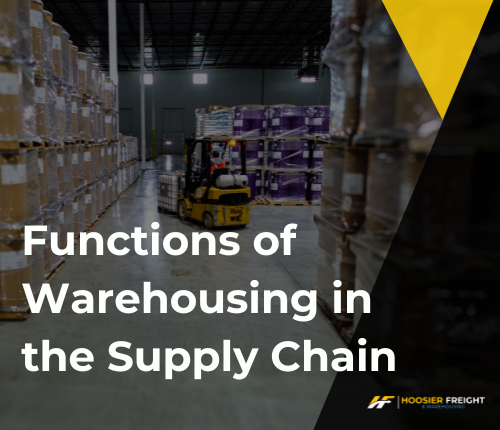
Importance of Warehousing in Modern Commerce
Navigating through the Freight and Warehousing domain reveals warehousing as more than mere storage spaces. Today’s warehouses are dynamic, multifunctional hubs integral to managing supply chains effectively, ensuring that businesses not only meet but exceed market demands.
What is the Importance of Warehousing?
Warehousing stands as a critical junction in the logistics chain, providing essential services that extend well beyond mere storage, touching on inventory management, order processing, and logistical support.
Logistics Components
Warehousing’s integration with logistics components like transportation, inventory management, and order fulfillment exemplifies its central role. It acts as a pivotal node enhancing coordination and efficiency, ensuring the smooth transit of goods from suppliers to consumers. According to a logistics industry report, “Warehouses contribute to an estimated 20% increase in logistical efficiency when strategically placed and well-managed.”
Why is Warehousing Important to a Business?
Warehousing is vital to any business involved in the production or distribution of goods. It stands as a cornerstone in the logistics system, offering much more than just storage space. By enabling effective inventory management, warehousing helps businesses balance supply with demand, ensuring products are available when customers need them, thus avoiding stockouts or overproduction. Efficient warehousing operations can lead to significant cost savings by optimizing storage space, reducing handling costs, and minimizing waste through improved inventory accuracy.
Moreover, warehouses facilitate the fulfillment of orders in a timely and organized manner, which is crucial for customer satisfaction and loyalty. “A recent industry report highlighted that businesses with optimized warehousing strategies saw a 25% increase in customer satisfaction due to faster delivery times and higher order accuracy,” reflecting the direct impact of warehousing on business success.
Furthermore, advanced warehouses offer value-added services such as packaging, assembly, and customization, allowing businesses to tailor their products closer to the point of delivery and streamline their supply chain. This adaptability not only enhances operational efficiency but also opens new opportunities for businesses to expand their market reach and respond dynamically to consumer demands.
In essence, warehousing is indispensable for maintaining a competitive edge in today’s fast-paced market, underlining its importance beyond mere storage to being a critical component of effective supply chain management.
Importance of Warehousing in Commerce
Warehousing’s role in commerce is critical for enabling businesses to swiftly meet customer demands. By strategically positioning goods near marketplaces, delivery times are significantly reduced, which directly enhances customer satisfaction. A hypothetical case study on “ElectroComp Inc.” showed that after optimizing their warehousing strategy, they experienced a 30% improvement in order fulfillment speed and a 25% reduction in delivery-related costs.
Private Warehouse
Private warehouses offer tailored solutions, granting businesses control over their inventory and logistics operations. This exclusivity can lead to streamlined supply chains tailored to specific business needs. “FashionForward,” a retail giant, utilized its private warehousing network to reduce seasonal inventory overflow costs by 40%, illustrating the efficiency and cost-effectiveness of private warehousing.
What is the Main Purpose of a Warehouse?
Warehouses are critical components of the supply chain, serving several purposes that align with both operational and strategic business goals. While the primary function of a warehouse is often thought of as simply storing goods, their role is far more comprehensive and integral to efficient business operations.
Storage and Space Optimization
At its core, a warehouse offers space optimization through organized storage solutions. This involves the systematic arrangement of goods in a way that maximizes space utilization while ensuring easy access to items as needed. Effective storage systems help in maintaining the quality of stored goods and reducing damages or losses.
Inventory Management
Warehouses play a vital role in inventory management by providing a central point for storing all inventory before it’s distributed to retailers or direct to consumers. This centralization allows for more accurate inventory tracking and management, helping businesses to maintain optimal stock levels, reduce overstock, and minimize shortages.
Goods Distribution Planning
Warehouses are pivotal in the planning and execution of goods distribution. They serve as strategic hubs where goods are received, stored, and then distributed to their next destination. Effective distribution planning within warehouses ensures that products reach their market in the quickest and most cost-effective manner possible.
Order Fulfillment
Order fulfillment is another crucial function of modern warehouses, especially with the rise of e-commerce. Warehouses are equipped to handle picking, packing, and shipping processes, which are essential for timely and accurate delivery of customer orders. Efficient order fulfillment directly impacts customer satisfaction and loyalty, making it a key operational goal for any business.
Added Value Services
Many warehouses also offer value-added services such as product assembly, packaging customization, and quality inspections. These services provide additional value to the basic storage function, enabling businesses to meet specific customer requirements and improve the overall product offering.
In summary, warehouses are more than just storage facilities; they are dynamic environments that support a wide range of activities essential for effective supply chain management and business success. By integrating storage solutions with sophisticated inventory and order management systems, warehouses significantly contribute to the operational efficiency and strategic capabilities of businesses.
Factors Affecting Warehouses
Key factors like location, technological integration, and inventory management practices significantly influence the effectiveness of warehousing solutions. For instance, “LogiTech Solutions” leveraged automated storage and retrieval systems in their warehouse, boosting storage efficiency by 35% and reducing labor costs by 20%, underscoring the impact of technology on warehousing operations.
- Location:
- Proximity to major transportation hubs, such as airports, highways, and railroads, can drastically reduce inbound and outbound logistics costs.
- Accessibility to key markets influences delivery times and customer satisfaction, making location a critical strategic decision for optimizing supply chain efficiency.
- Consideration of geographic and climate-related risks (e.g., floods, earthquakes) is vital for minimizing potential disruptions to operations.
- Technological Integration:
- Implementation of Warehouse Management Systems (WMS) enhances inventory visibility, accuracy, and operational efficiency, facilitating real-time tracking and optimized workflows.
- Advanced robotics and automation, including drones for inventory checks and Automated Guided Vehicles (AGVs) for material handling, significantly reduce manual labor requirements and associated costs.
- Cutting-edge technology like Internet of Things (IoT) devices and Artificial Intelligence (AI) can predict inventory needs, optimize storage and picking routes, and improve overall warehouse operations.
- Inventory Management Practices:
- Just-In-Time (JIT) inventory strategies minimize holding costs by aligning inventory levels closely with demand, reducing excess stock and waste.
- Cross-docking techniques, where incoming goods are directly loaded onto outbound vehicles without long-term storage, streamline operations and reduce handling times.
- Effective SKU (Stock Keeping Unit) management and layout optimization ensure high-demand products are easily accessible, speeding up the order fulfillment process and enhancing customer satisfaction.
Importance of Warehouse Management
Efficient warehouse management is paramount for optimizing storage space, ensuring order accuracy, and expediting fulfillment times. Implementing best practices and technology, such as a Warehouse Management System (WMS), can streamline operations and support business scalability. Data from a logistics technology firm revealed that businesses adopting WMS saw a 50% decrease in order fulfillment errors, highlighting the critical role of effective warehouse management.
What are the Benefits of Warehousing?
Warehousing offers a myriad of benefits crucial for the streamlined operation of supply chains in various industries. By delving into each benefit, we can uncover the substantial impact warehousing has on overall business efficiency and customer satisfaction.
- Inventory Optimization:
- Warehouses equipped with advanced management systems enable precise control over inventory levels, effectively balancing supply with demand. This capability is crucial for avoiding overstocking, which ties up capital unnecessarily, or stockouts, which can lead to lost sales and eroded customer trust.
- A notable example involves a leading e-commerce company that implemented a real-time inventory management system within its warehouses. The system’s ability to accurately predict stock requirements based on historical data and market trends led to a 30% decrease in overstock and a 25% improvement in avoiding stockouts, significantly enhancing operational efficiency.
- Cost Reduction:
- By optimizing storage solutions and improving the efficiency of distribution operations, warehousing can considerably lower logistics expenses. Consolidation of shipments and strategic location selection are key factors in minimizing transportation and handling costs.
- A case study from a global manufacturing firm revealed that by centralizing its warehousing operations and employing just-in-time delivery methods, it was able to reduce its logistics costs by up to 20%. This strategic approach not only lowered storage and transportation expenses but also streamlined their supply chain, making it more agile and responsive.
- Enhanced Customer Service:
- Effective warehousing ensures that products are readily available for prompt and accurate dispatch, a critical factor in meeting customer expectations for quick delivery times and order accuracy. Additionally, warehousing facilities that offer value-added services such as product customization and last-minute order changes can significantly enhance customer satisfaction.
- In an illustrative instance, a retail company leveraging a sophisticated warehousing system reported a notable increase in customer satisfaction rates. The system’s efficiency in processing and fulfilling orders accurately resulted in a 40% boost in positive customer reviews, highlighting the direct link between warehousing efficiency and customer service excellence.
Warehousing stands as a foundational element in achieving logistical and operational excellence. Its role in inventory optimization, cost reduction, and enhancing customer service underscores its importance in today’s competitive business environment. By strategically managing warehousing operations, businesses can benefit from substantial improvements in efficiency, cost savings, and customer loyalty, thereby securing a stronger position in the marketplace.
10 Advantages of Warehousing
Warehousing’s benefits are vast, offering supply chain efficiency enhancements, risk management, market expansion opportunities, and much more. A comprehensive study by “Global Supply Chain Insights” found that companies utilizing advanced warehousing strategies reported an average logistics cost savings of 25%, a testament to warehousing’s multifaceted advantages.
- Supply Chain Efficiency: Streamlines supply chain operations, enhancing overall efficiency.
- Risk Management: Provides a secure environment for goods, minimizing the risk of loss or damage.
- Market Expansion: Facilitates expansion into new markets by strategically positioning goods.
- Value-Added Services: Offers services like packaging and labeling, adding value to stored products.
- Flexibility and Scalability: Adapts to fluctuating demand, supporting business growth.
- Improved Inventory Management: Utilizes advanced systems for accurate inventory tracking and management.
- Reduced Transportation Costs: Strategic locations minimize transportation expenses.
- Quality Control: Ensures product integrity through proper storage conditions and handling.
- E-commerce Support: Plays a crucial role in e-commerce logistics, managing online order fulfillment.
- Business Continuity: Enhances supply chain resilience, supporting business continuity plans.
The strategic importance of warehousing in modern commerce and supply chain management is undeniable. From fostering supply chain efficiency and scalability to enhancing customer satisfaction through improved service delivery, warehousing provides businesses with a competitive edge in the global marketplace.
Maximize your supply chain capabilities with Hoosier Freight and Warehousing. Our advanced warehousing solutions are designed to meet your unique needs, propelling your business to success. Contact us today to learn how our warehousing services can revolutionize your logistics operations.



